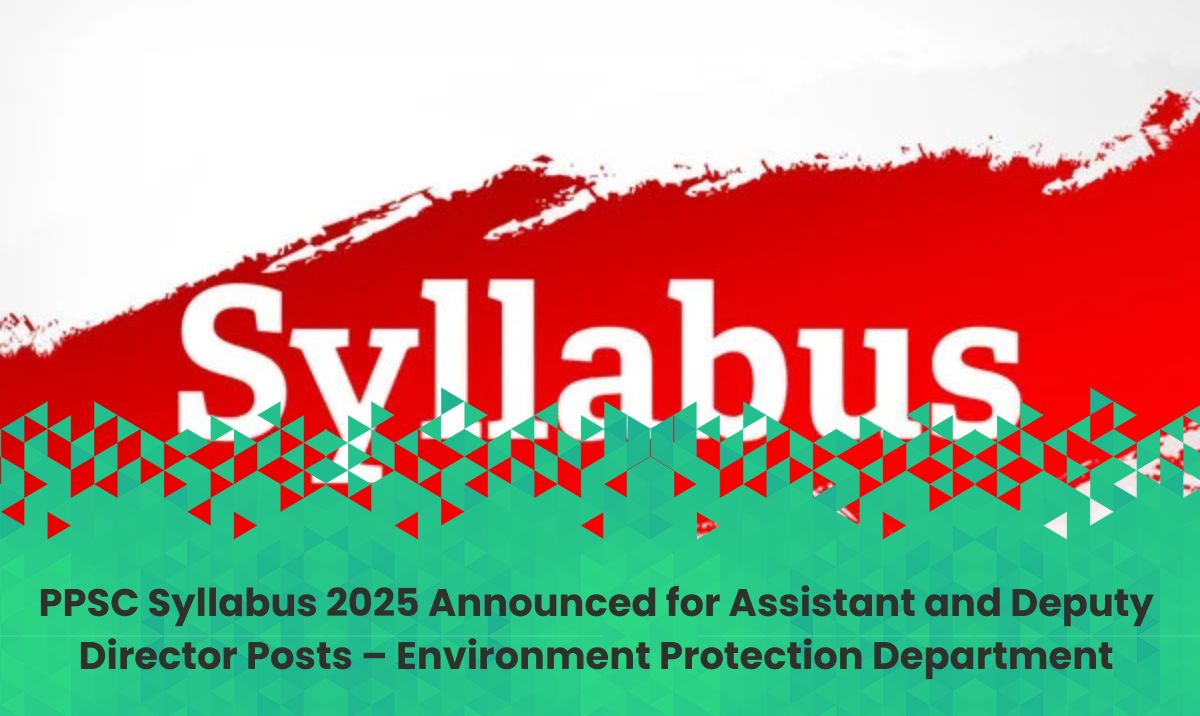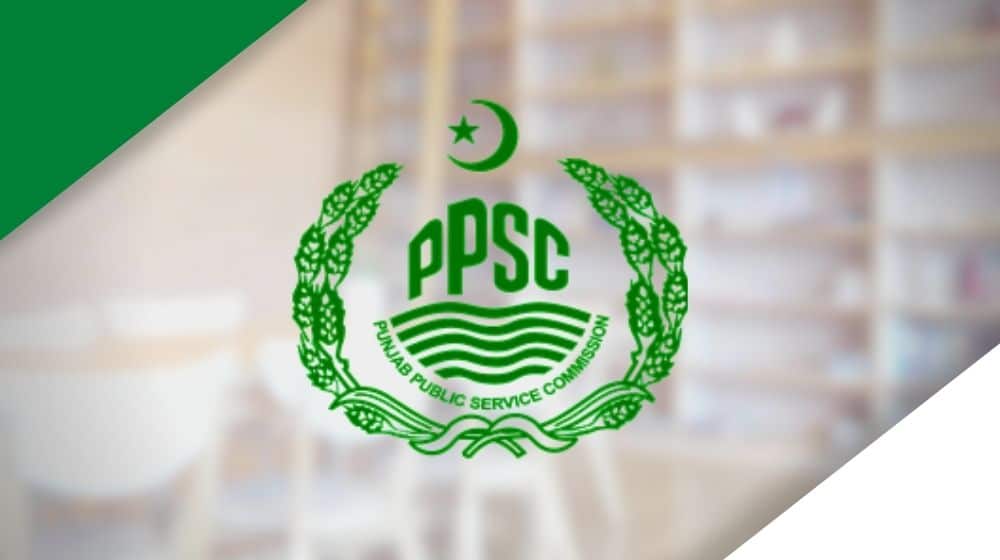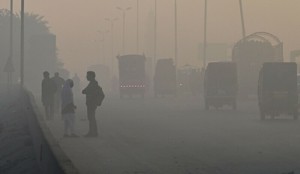
The Punjab Public Service Commission (PPSC) has officially announced the PPSC Syllabus 2025 for various posts under the Punjab Environment Protection and Climate Change Department. The update includes detailed syllabi for Assistant Director and Deputy Director positions within the Environment Policy Centre. The announcement, dated October 31, 2025, marks the beginning of a significant recruitment phase for environmental professionals in Punjab.
List of Announced Posts and Case Numbers
According to the official PPSC notice, the syllabus has been issued for the following posts:
-
46G2025 – Assistant Director (Water and Ground Water)
-
47G2025 – Assistant Director (Air Shed)
-
48G2025 – Assistant Director (Natural Resources)
-
49G2025 – Assistant Director (State of Environment)
-
50G2025 – Assistant Director (Environmental Economics)
-
51G2025 – Assistant Director (Hazardous Substances)
-
52G2025 – Assistant Director (Biodiversity)
-
53G2025 – Assistant Director (Sustainable Development)
-
54G2025 – Assistant Director (Soil and Waste)
-
55G2025 – Deputy Director (Strategy and Policy)
-
56G2025 – Deputy Director (Climate Change)
All of these positions fall under the Environment Policy Centre, a division of the Punjab Environment Protection and Climate Change Department.
Department Overview
The Punjab Environment Protection and Climate Change Department is responsible for ensuring environmental conservation, sustainable resource management, and policy implementation across the province. It develops and enforces laws and policies related to pollution control, biodiversity, waste management, and climate resilience. The newly advertised posts indicate the department’s commitment to expanding its human resource capacity and tackling pressing environmental challenges such as air pollution, water scarcity, and global warming.

PPSC Syllabus 2025 – Main Components
The PPSC written test for these positions will evaluate candidates on their knowledge of environmental science, policy, management, and general administrative subjects. While the syllabus differs slightly depending on the specialization, it generally includes the following components:
1. General Knowledge and Current Affairs (20%)
-
Pakistan’s geography, governance, and economy
-
Current environmental issues at national and international levels
-
Climate change initiatives such as the Paris Agreement and COP summits
-
Environmental legislation and government programs related to sustainable development
2. Subject-Related Portion (70%)
Each specialization includes technical knowledge relevant to the post. Examples include:
-
Water and Ground Water: Hydrology, water quality monitoring, and pollution control.
-
Air Shed: Air pollution sources, air quality standards, and emission control techniques.
-
Natural Resources: Conservation, forestry, and ecosystem management.
-
State of Environment: Environmental assessment, sustainability indicators, and reporting.
-
Environmental Economics: Economic valuation of environmental goods, cost-benefit analysis, and green economy policies.
-
Hazardous Substances: Waste management, chemical safety, and hazardous material regulations.
-
Biodiversity: Species conservation, ecosystem services, and national biodiversity strategy.
-
Sustainable Development: SDGs, renewable energy policies, and environmental planning.
-
Soil and Waste: Solid waste management systems and soil conservation methods.
-
Strategy and Policy: Environmental impact assessment, strategic policy design, and implementation.
-
Climate Change: Climate modeling, adaptation strategies, and mitigation techniques.
3. English and Analytical Skills (10%)
-
Grammar and vocabulary
-
Reading comprehension
-
Analytical reasoning and report writing on environmental issues
Exam Format
The written test will consist of 100 multiple-choice questions (MCQs) carrying 100 marks, with a time duration of 90 minutes.
-
Each incorrect answer will result in a deduction of 0.25 marks.
-
The test medium will be English.
Candidates who pass the written examination will be shortlisted for an interview, where communication skills, environmental awareness, and analytical ability will be assessed.
Preparation Guidelines for Candidates
Applicants are encouraged to start preparation as early as possible using both theoretical and practical study materials. The following tips can help:
-
Study previous PPSC papers related to the environment and administrative sciences.
-
Read official reports by Punjab EPA, UNDP, and the Ministry of Climate Change.
-
Review Pakistan Environmental Protection Act (PEPA) and related environmental policies.
-
Stay updated on national and global environmental developments.
-
Practice mock tests to improve time management and analytical accuracy.
Candidates should also focus on building conceptual clarity around sustainability, pollution control, and policy-making frameworks since these are core topics across all environmental posts.
Importance of the Announced Positions
These positions are critical for implementing Punjab’s environmental and climate strategies. Successful candidates will play key roles in:
-
Designing and executing environmental protection projects.
-
Monitoring pollution and developing mitigation measures.
-
Conducting research for sustainable development.
-
Formulating climate adaptation and conservation policies.
-
Promoting environmental education and awareness at the community level.
The recruitment aligns with Punjab’s goal to strengthen institutional capacity for achieving the United Nations’ Sustainable Development Goals (SDGs).
Accessing the Detailed Syllabus
The complete PPSC Syllabus 2025 for all case numbers (46G2025 to 56G2025) is available on the official PPSC website (www.ppsc.gop.pk) under the “Syllabus” section. Candidates can download the relevant syllabus in PDF format for detailed topic coverage and test preparation.
The PPSC Syllabus 2025 announcement for Assistant and Deputy Director posts under the Punjab Environment Protection and Climate Change Department provides a valuable opportunity for qualified candidates to contribute to the province’s environmental sustainability efforts. With a strong focus on policy, conservation, and climate action, these roles will help shape Punjab’s green future. Candidates are advised to prepare thoroughly according to the syllabus, stay updated with environmental developments, and check the PPSC website regularly for test dates and updates.















